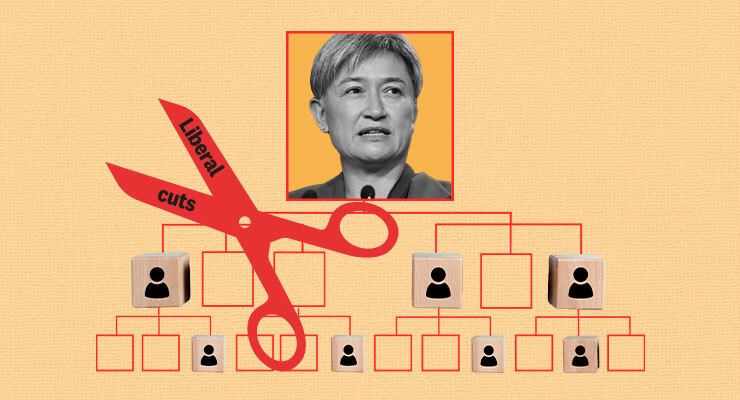
Penny Wong appears to have made a solid start as foreign affairs minister, but what of her department? Insiders say the Department of Foreign Affairs and Trade (DFAT) has been so hollowed out by the previous government it is estimated it will take two to three terms of government to staff it at levels commensurate to the tasks ahead.
Just as China is making significant trade and military overtures in our region with traditional allies, and the need to lift our humanitarian aid is a pressing concern, DFAT is running on the smell of an oily rag. DFAT staffing levels, local and overseas, totalled 6401 in 2013. By 2021, just under 1000 jobs had been cut under the Coalition. Two thousand years of experience were lost in a decade, and the work is largely outsourced to former DFAT and AusAID staff. The development expertise inside DFAT is weak; the number of development design specialists can be counted on one hand.
Over the past decade, our foreign aid was cut by 31%. On top of the cuts has been poorly directed spending, like the $65 million we spent on building a chancellery for Australian diplomats in the Solomon Islands; a sum that could have paid for 50 teachers in that nation for 100 years. Or helped refund the World Mosquito Program, or helped deal with ongoing climate disasters that threaten to overwhelm the region.
And as flooding engulfed Pakistan — a disaster induced by the climate crisis — Fiji PM Frank Bainimarama tweeted about the culpability of high-emitting nations like Australia.
Development was one of the “Three Ds” Eisenhower and the West championed as key to winning friends in the messy world of geopolitics (the other two being diplomacy and defence). As China’s successful regional forays are showing, the Coalition’s obsession with small government and its parsimony in foreign aid are having serious and deleterious long-term effects.








The stupidity and mean spirit will haunt us for years.
Under previous governments we built two suspension bridges across the Mekong in Vietnam ( called by the locals, “Our Australian Bridge ” and “Our Second Australian Bridge”)
In Cambodia & Laos , there were a number of concrete beam & simple steel truss bridges to replace the bamboo bridges which were washed away every wet season – each of these was also named “our Australian bridge” – the concrete ones had a red kangaroo embossed into one end of each beam. A small good will gift allowing communications and local trade to continue year round. The memory of such aid lasts for decades.
I believe that the former LNP governments werent the slightest bit interested in governing. They were in it for their own gain, specifically by selling favourable legislation to big business and billionaires, particularly the fossil folk. Obviously they didnt want to look like they were being bribed so the pay off was supposed to happen after they finished in politics and would have been in the form of sinecures like board positions, special consultants like their mates before them. Unfortunately they pushed the poo too far and now no one can afford to have any of them on their boards. There were probably other secret payments we may never know about.
So all this other stuff would be a complete surprise to them. Who knew China was poking around in the Pacific? Not them.
This paper, from the University of Ottawa last month, compares the structure and performance of the Canadian Foreign Ministry with those of other countries, including the US, UK, France, Australia, China and Russia. For those interested in such things, it is a very good report, and, for Australians, provides an excellent analysis of DFAT. Warning – it is 80 pages long but you can skip to the DFAT section easily.
https://www.cips-cepi.ca/wp-content/uploads/2022/09/Competitive-Expertise-and-Future-Diplomacy-published-version.pdf
Oh woe is us as a nation! This state of affairs is appalling.
Foreign Affairs does need to be rebuilt, but with a significant cultural shift from its past elitist approach to the world.
There may be an argument for removing the aid function and establishing it as an independent authority again.
Absolutely, Peter. A huge amount of expertise and experience has been lost since the demise of AusAID. For years, Australian aid agencies have been advocating for a more substantive, well-funded and well-directed international development program. The arguments now sound prophetic. “We will weaken relationships, particularly in the Pacific; other less friendly nations will fill the vaccuum we leave; less effective health systems make all of us vulnerable; weaker economies reduce potential markets for our goods…” All fell on deaf ears. Now Australian aid is at its lowest level ever; our reputation in SE ASia and the Pacific is shot; Chinese influence is ascendent; we’re desperate for new markets; and our poorer neighbours provide a perfect opportunity for viruses to take hold. Who would have thought!
Should include using the Australian diaspora versus rewarding former &/or retired insiders with plum consultancy roles etc.
If Peter Hannigan reads my link above, he may find that the past elitist approach is exactly that – past.
And yes, the aid function should be separated into a separate (not necessarily independent) agency again.
As always with a simple comment it hides the context and confuses. So apologies. So a bit extra for you and Terry. What I meant was not recreate DFAT as it was, but as it needs to be now. Yes, DFAT did try and recruit the best and the brightest. I have met quite a few working internationally and in Canberra. Some are/were truly great at their job – despite often incoherent approaches by the governments they represented.
However the problem is that ‘the best and the brightest’ can be a very unrepresentative group of the society they come from. They tend to come from the wealthy elite end of society who had the best education. That in itself can just be good intellectual preparation. However unless there is an ability to understand and relate to different cultures and different levels of society then it just becomes elites talking to the local elites, often in very ritualised forms separate from the host society.
This is a real problem in many developing countries where the people can be charming but the governance structure is fundamentally corrupt and incompetent. This view of mine is based on 13 years of working in ‘challenged’ developing countries doing system wide aid work.
I don’t recall that it had an “elitist approach to the World” . I do recall that we had some of the brightest and best (with language skills to match) and that they were regarded as ‘elitist’ by those who did not quite meet those high standards